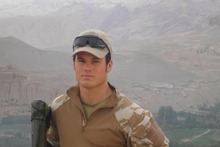
Young Army officer dies while jogging
By David Fisher
3:38 PM Tuesday Feb 24, 2015

Captain Dan Thompson. Photo / supplied
A young Army officer who endured New Zealand's most deadly period in Afghanistan died after a suspected heart attack while out on his morning run.
Captain Dan Thompson, 29, whose family live in Muriwai north of Auckland, was expected to rise to the highest of ranks in the Army before tragedy struck on Saturday.
Emergency services personnel say they fought for an hour to try and save the life of Captain Thompson after being called for help to a walkway above Sumner about 9am.
A spokesman for St John said Captain Thompson was in a criticial condition when taken to Christchurch Hospital by the Westpac Rescue Helicopter and died shortly after.
Captain Thompson, who had planned to marry fiancee Anna Jack next month, signed up with the Army in 2006 while a student at Victoria University, going through officer training and being posted to 2/1st Battalion Royal New Zealand Infantry Regiment at Burnham.
He served in East Timor in 2007 and Afghanistan in 2012 - the latter he later described as "probably our toughest tour" after the loss of five people from the Bamyan-based Provincial Reconstruction Team.
The comment was made during an interview with Canterbury University's magazine Canta after the Army encouraged him to take up tertiary study to prepare him for higher ranks.
"When I was in Afghanistan I was briefing foreign ministers, so when they start (talking about) low-level or mid-level policy, the Army doesn't want me standing there going like, 'What are you on about'?"
Captain Thompson, who was the fourth generation of his family to join the Army, told Canta he was at ease with the risks which came with war.
He was monitoring by radio a patrol which struck an IED killing Corporal Luke Tamatea, 31, Lance Corporal Jacinda Baker, 26, and Private Richard Harris, 21.
"Losing three of your soldiers at once and you hear it over a radio, that's more bone breaking than even seeing things firsthand because you can't do anything about it," he said. "It's happened, it's a second in time, it had nothing to do with how good they were. It's just war, it happens.
"You can be the best soldier in the battlefield and if a sniper decides to shoot you then... that's it."
A funeral for Captain Thompson is being held on Thursday at Burnham Military Camp near Christchurch with personnel from around the country expected to support parents Graeme and Angela Thompson, and Ms Jack.
By David Fisher
- NZ Herald
Copyright ©2015, APN New Zealand Limited
